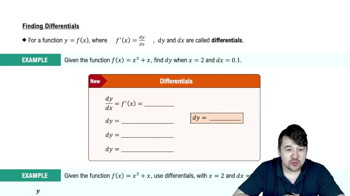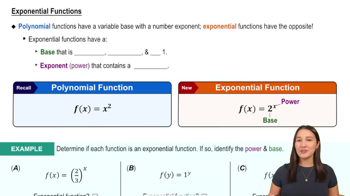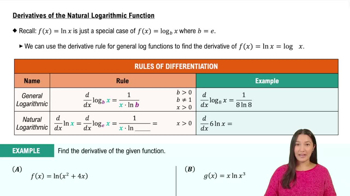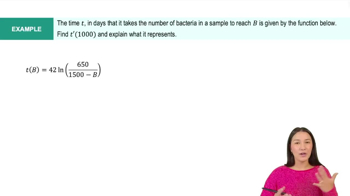Table of contents
- 0. Functions7h 52m
- Introduction to Functions16m
- Piecewise Functions10m
- Properties of Functions9m
- Common Functions1h 8m
- Transformations5m
- Combining Functions27m
- Exponent rules32m
- Exponential Functions28m
- Logarithmic Functions24m
- Properties of Logarithms34m
- Exponential & Logarithmic Equations35m
- Introduction to Trigonometric Functions38m
- Graphs of Trigonometric Functions44m
- Trigonometric Identities47m
- Inverse Trigonometric Functions48m
- 1. Limits and Continuity2h 2m
- 2. Intro to Derivatives1h 33m
- 3. Techniques of Differentiation3h 18m
- 4. Applications of Derivatives2h 38m
- 5. Graphical Applications of Derivatives6h 2m
- 6. Derivatives of Inverse, Exponential, & Logarithmic Functions2h 37m
- 7. Antiderivatives & Indefinite Integrals1h 26m
- 8. Definite Integrals4h 44m
- 9. Graphical Applications of Integrals2h 27m
- 10. Physics Applications of Integrals 2h 22m
6. Derivatives of Inverse, Exponential, & Logarithmic Functions
Derivatives of Exponential & Logarithmic Functions
Problem 3.R.47
Textbook Question
9–61. Evaluate and simplify y'.
y = 2^x²−x
 Verified step by step guidance
Verified step by step guidance1
Step 1: Identify the function y = 2^{x^2 - x}. This is an exponential function where the base is 2 and the exponent is a quadratic expression in x.
Step 2: To find y', the derivative of y with respect to x, use the chain rule. The chain rule states that if you have a composite function y = f(g(x)), then the derivative y' = f'(g(x)) * g'(x).
Step 3: Recognize that the outer function is an exponential function with base 2, so the derivative of 2^u with respect to u is 2^u * ln(2). Here, u = x^2 - x.
Step 4: Differentiate the inner function u = x^2 - x with respect to x. The derivative of x^2 is 2x, and the derivative of -x is -1, so u' = 2x - 1.
Step 5: Apply the chain rule: y' = (2^{x^2 - x} * ln(2)) * (2x - 1). This is the derivative of the given function y with respect to x.
 Verified video answer for a similar problem:
Verified video answer for a similar problem:This video solution was recommended by our tutors as helpful for the problem above
Video duration:
3mPlay a video:
Was this helpful?
Key Concepts
Here are the essential concepts you must grasp in order to answer the question correctly.
Differentiation
Differentiation is a fundamental concept in calculus that involves finding the derivative of a function. The derivative represents the rate of change of the function with respect to its variable. In this case, we need to differentiate the function y = 2^(x² - x) to find y'.
Recommended video:

Finding Differentials
Chain Rule
The Chain Rule is a key technique in differentiation used when dealing with composite functions. It states that the derivative of a composite function is the derivative of the outer function evaluated at the inner function, multiplied by the derivative of the inner function. For the function y = 2^(x² - x), applying the Chain Rule is essential to correctly differentiate the exponent.
Recommended video:

Intro to the Chain Rule
Exponential Functions
Exponential functions are functions of the form f(x) = a^g(x), where a is a constant and g(x) is a function of x. The derivative of an exponential function can be computed using the formula f'(x) = a^g(x) * g'(x) * ln(a). Understanding how to differentiate exponential functions is crucial for evaluating y' in this problem.
Recommended video:

Exponential Functions

 4:50m
4:50mWatch next
Master Derivatives of General Exponential Functions with a bite sized video explanation from Callie
Start learningRelated Videos
Related Practice














